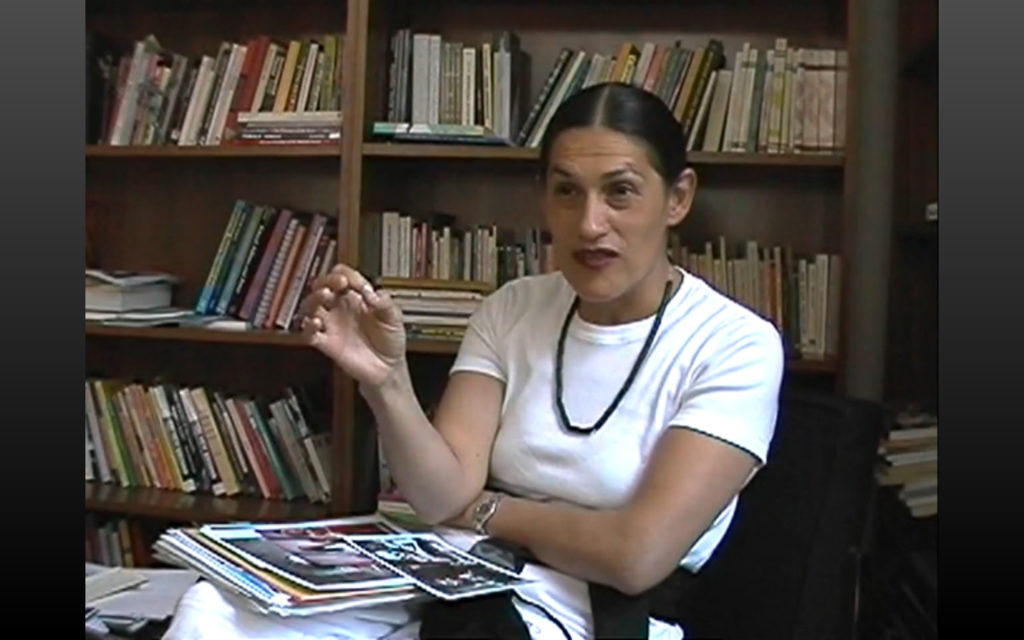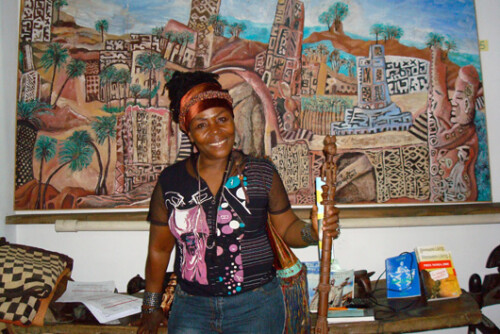Introduction: Relajo’s Activist Refusal
In a grainy online video 1 , activist and performance artist, Jesusa Rodríguez is flipping through photographs of her old work in a book-lined office, saying, “ah, yes, this is La Malinche I was telling you about, from the Conquest.” 2 Diana Taylor (off-screen) takes the photo and replies, “How great. We’ll get a copy of this. Can you do what you were telling me about yesterday, where ‘she said that she says that…?’” And without a change in set or costume, archival photographs still balanced on her lap, Rodríguez begins “The Conquest According to La Malinche”: “Good evening, dear urinal-goers. Today I have come to inform you, or to tell you, or to narrate to you, what really happened when what happened came to pass.” 3

This is an improvised re-performance of a piece Rodríguez originally performed in the 1980s, and slightly revised into the text that she published as, “La Malinche en Dios TV” in 1991. 4 And Rodríguez’s original Malinche was, of course, a re-performance and re-telling of a mythic figure whose story has been retold since Hernán Cortés relied on her storied language skills to act as his ‘tongue’ (la lengua, which is also ‘language’) and translate Spain’s way to the conquest of Tenochtitlán (now Mexico City). Known by several different names – Malintzin, Doña Marina, La Llorona – La Malinche has seen her story told and retold for over four centuries in the service of shifting definitions of Mexican as well as Chicano nationalism, raciality, sexuality and gender, and perhaps most famously Octavio Paz has told her story as la chingada – both the raped mother of all Mexicans and the treasonous indigenous woman who betrayed the country to the Spanish. 5 Rodríguez performs La Malinche as a medium of the telling/saying of the conquest of Mexico – playing with the various conjugations, forms and Mexican colloquial meanings of decir (to say), becoming the discourse (and discursive figure) through which the multiple tellings of nation, race, sex and gender are achieved. Her repetition of the saying, her lingering and staying in the saying, is also a way to make fun of the various tellings, to share a joke with the historical figure, Malintzin – to locate her in a contemporary moment, watching TV (Tezcatlvisa), scoffing at the Tlatoani’s scheme to “modernize the state” with “wireless Papantla bungee jumpers,” irreverent of both the Mexican leaders and Spanish conquistadors (“half man, half hotpant!”) whose wishes she serves and queerly subverts:
And he tells me, he says, “Look, just tell us where the water is,” he says. “We’re looking for Evian water.” And I tell him, I tell him, “Evian quoi?” As if I couldn’t speak French, right? And I tell him, “I’m the first cunnilingual translator of Mesoamerica.” 6
Rodríguez-as-Malintzin-as-teller queers this ‘tongue’ in a long drawn-out joke that is as much about pre-colonial patriarchy – Aztec leaders were always men, known as Tlatoani, which means “He Who Speaks” – as its colonial and post-colonial afterlives. And she shares this joke with us, her audience (most obviously Taylor, who you can hear laughing along throughout this impromptu performance), to make fun, it seems, of the battles over who gets to tell the story and how, to both invoke and suspend the seriousness of the brutally persistent, repetitive and ongoing violences of misogyny and colonial modernity in Mexico. 7
The performance technique that Rodríguez demonstrates here – of raising a topic that everyone (being addressed) knows is painful and, without belittling or undermining the source or force of that pain, inviting the audience to linger in it together for a while, to share some jokes about it, little jokes that can only be funny because you share that pain in some way, little jokes that depend on and build shared referents and intimacy, that spiral and build ephemeral connective tissues between disparate subjects and scenarios, dissipating, if only for the duration of this performance, the aggregate power exercised by that pain – can be understood as a kind of queer relajo. From the verb relajar (to relax), relajo describes a kind of joking-around that interrupts the established order or trajectory of conversation or events. Taylor defines relajo as “an act of spontaneous disruption [that] shatters the given configuration of the group or community…. It is an act of devalorization, or what the late Mexican intellectual Jorge Portilla calls ‘desolidarization’ with dominant norms in order to create a different, joyously rebellious solidarity – that of the underdog.” 8 Portilla explored this affective phenomenon most thoroughly and influentially in his Phenomenology of Relajo, published posthumously in 1966, where he characterizes this as a particularly Mexican pathology: “The sense or meaning of relajo is the suspension of seriousness, that is to say, suspending or annihilating a subject’s adherence to a value proposed to his or her freedom.” 9 That is, Portilla ultimately casts relajo as a compulsive irreverence that annihilates Mexico’s (and Mexicans’) possibility of gaining freedom. According to Carlos Alberto Sánchez, Portilla sees relajo as “defiant against the purported edification of social rules and customs, inherited rules for progress, order, and civility.” 10 While several scholars have echoed Portilla’s condemnation of this peculiar affect of incivility, I want to take Sánchez’s lead here and return to Portilla’s relajo both for the compellingly decolonial potentiality that he suggests and disavows, and for the frequency with which I see relajo creatively deployed in art and activism around gender, sexual, economic, indigenous and racial justice in Mexico.
On the one hand, this essay draws attention to relajo as a particularly Mexican queer affective strategy that has been used to ‘suspend’ and disorient the values of colonial modernity – which of course include but are not limited to patriarchy, restrictive binary genders, heterosexist terrorism and more recently homonationalist militarism. 11 On the other hand, while relajo might be best thematized in Mexico, it is by no means nationally exclusive. As Sánchez argues “relajo is not a social phenomenon limited to the Mexican experience, but a social phenomenon manifested everywhere, but oftentimes lacking a name.” 12 Indeed, its closest named relative might be choteo, as used in Cuba. In perhaps the most well-known treatise on the topic, Indagación del choteo (1928), Jorge Mañach diagnoses Cuba much in the same way that Portilla will diagnose Mexico, as suffering from a compulsion to choteo, which “does not take seriously anything that is generally taken seriously.” 13 While Portilla distinguishes between choteo (as a sort of teasing that demonstrates superiority) and relajo, they have both been interpreted as obstacles to participation in modernity, and they have also both been highly cultivated in queer arts and activism. 14 I focus here on the ways that activists in Mexico have used relajo to build movements and priorities around sexuality that are oriented away from the liberal modern colonial project of sexual identity politics and rights and towards transnational and translocal movements for decolonizing, economic and social justice. I hope, moreover, to suggest that we attend more carefully to similar affective strategies – of suspending, scrambling, disorienting, making fun of and confusing power – being used well beyond any one nation’s borders and at least throughout the decolonizing Americas.
I am interested in those shifting modes of affect that communicate incivility, and how uncivilized affects are associated with or, as Sara Ahmed would say, “stuck to certain bodies” 15 – those read as poor, black, latina/o, indigenous, transgender or transsexual, gender-non-conforming and/or generally queerly inconsistent with the ideal subjects of colonial modernity. This essay is part of my larger project, focusing on the ways that these affects are mobilized by visual, literary and performance artists and activists in the hemispheric Americas. Here, I read relajo as an activist practice of incivility, which functions as affective refusal: it might take the form of a refusal or inability to perform happiness, accord or optimism, but can just as surely include the refusal or inability to perform sober serious realism. This research takes up José Esteban Muñoz’s work on the worlding potentialities of queer feelings for utopia – the horizon of a yet-to-come that compels us to feel beyond the intentionally restricted limits of the possible. He urges us to recognize that “[u]topian and willfully idealistic practices of thought are in order if we are to resist the perils of heteronormative pragmatism and Anglo-normative pessimism.” 16 Indeed, we need to ask: who has the privilege and power to afford pessimism and pragmatism, and for whom is a certain impertinence to the impossible, an irreverence to the serious, the primary strategy for survivance? If pessimism, which is sometimes figured as a resistance to or confrontation with power, can work as effectively as optimism or happiness, which are sometimes figured as acquiescence to power, it seems worth attending to those affects that refuse to engage with, or be engaged by, power and privilege – those like relajo that just won’t (or can’t) take power seriously, and so undermine or scramble its regulatory effects.
In The Suspension of Seriousness: On the Phenomenology of Jorge Portilla (2012), the first book-length analysis of Portilla’s work and context, as well as the first English translation of Phenomenology of Relajo, Sánchez argues that Portilla was so enmeshed in the philosophical traditions, logics and value-systems of colonial modernity that he could neither appreciate nor commit to the post-colonial analysis that his work on relajo develops. Sánchez explains,
On the cusp of breaking through the Western paradigm and to an idea which we could call “postcolonial,” Portilla flinched at the thought that perhaps relajo was a particularly anti-Western form of liberation, a reaction to colonial seriousness. He opted for the traditional prejudice favoring the wisdom of Western rationality. 17
Portilla seems unwilling to pursue the implications of his own theory, but he leaves us an extended essay on the social and sensorial minutiae of an anti-colonial, anti-Western, and liberatory affect. Looking closely, with Portilla, at what relajo does and undoes, we might see an affective phenomenon, and structure of feeling, that operates to disarticulate sexuality, sociality and political imaginaries from normative colonial seriousness.
While Carlos Monsivaís, Mexico’s late dearly beloved openly gay chronicler of popular culture and everyday life, wrote much less about activist strategies than he did about the absurdities and cruel excesses of late twentieth-century power inequalities and the creative and unlikely modes by which the most de-resourced populations manage to survive and thrive, he did make an explicit link between relajo and queer resistance. In his brief history of homosexuality in Mexico, “The 41 and the Great Raid” (2002), Monsivaís explains that,
the starting point of gay resistance is the conversion of fatalism into relajo, of guilt into a fashion show, of condemnation into the ridiculization of linguistic conventions…. If, so to speak, los maricones [fags/queers] did not make fun of fate (which is what made them), and did not laugh in passing at some of the social axioms that so cruelly harass them, they never would have acquired the indispensible identity which is, at once, the abandonment of hope and the exhilaration of knowing you’re alive despite everything. 18
Queer ‘resistance’ depends not so much on exposing and opposing cruelty and fatalistic resignation, or even unequivocally refusing the terms of condemnation and death. Instead, the activism and survival of sexual and gender dissidence in Mexico depends crucially on ‘ridiculizing’ and making exhilarating fun of the conditions of hopelessness and oppression.
We might even say that Monsiváis positions relajo as a key affective range for what Eve Sedgwick describes as queer reparative practices, or “the many ways that selves and communities succeed in extracting sustenance from the objects of a culture – even of a culture whose avowed desire has often been not to sustain them.” 19 That is, in situating the affective strategy of relajo at the center of the story of queer resistance and activism, Monsivaís invites us to recalibrate our understandings of activism, resistance and queerness towards the reparative, towards those affective ranges – joy, thrill, laughter, nonsensical humor, goofiness, fun, love – that are at best treated as afterthoughts and at worst as betrayals of so much queer or broadly left political activism and theory. What Sedgwick describes as our compulsion to paranoid methods – where “no time could be too early for one’s having-already-known, for its having-already-been-inevitable, that something bad would happen” 20 – and what Wendy Brown describes as “left melancholy” – “a Left that has become more attached to its impossibility than to its potential fruitfulness” 21 – strike me, and plague me, as affective tendencies that are not only reflective but constitutive of a sort of white activist-intellectual positionality, performance and methodology in the Anglo Americas.
Sedgwick and Brown warn us that these are also the affective tendencies that lead us to reproduce so many of the dynamics and structures of power that we are ostensibly resisting. In States of Injury, Brown explains this phenomenon by way of “Foucault’s relatively simple insight that political ‘resistance’ is figured by and within rather than externally to the regimes of power it contests, [in order to] examine ostensibly emancipatory or democratic political projects for the ways they problematically mirror the mechanisms and configurations of power of which they are an effect and which they purport to oppose.” 22 In an effort to avoid this kind of mirroring – the sort that we’ve seen in the U.S., for example, that transforms queer activism against into homonationalist celebration of the necropolitical effects of imperialism, militarism, patriarchy, racism, nationalism and capitalism – we might retune our activism and academic work to those affective strategies that ridiculize, scramble and suspend rather than confront, denounce, expose or reproduce the seriousness of modern colonial power. 23
- Jesusa Rodríguez, “La conquista según La Malinche” (17:03-23:10), June 4, 1999, Hemispheric Institute Digital Video Library, http://hemisphericinstitute.org/hemi/component/k2/item/19-jesusa-interview-la-malinche.[↑]
- Translated by Marlène Ramírez-Cancio and published as “The Conquest According to La Malinche,” in Diana Taylor and Roselyn Costantino, eds., Holy Terrors: Latin American Women Perform (Durham: Duke University Press, 2003): 231. All further citations of this performance refer to this publication. [↑]
- Rodríguez, “The Conquest,” 231.[↑]
- Jesusa Rodríguez, “La Malinche en Dios TV,” Debate Feminista 2.3 (1991): 308-311. The title is a play on words, both “La Malinche in God TV” and “La Malinche in God sees you.” The date of first performance is difficult to determine, but a video of “La conquista de Tenochtitlán según La Malinche” is included in the documentary, Jesusa, directed by Ana Luisa Liguori y Eduardo Sepúlveda in 1985, https://www.youtube.com/watch?v=FsO_6iv8Ubc.[↑]
- Octavio Paz, The Labyrinth of Solitude: And the Other Writings, trans. Lysander Kemp (New York: Grove Press, 1985), 75-88.[↑]
- Rodríguez, “The Conquest,” 231-2.[↑]
- For more on the necessity of thinking the historical, cultural, social and economic projects of modernity in conjunction with those of colonialism, see Saurabh Dube, “Introduction: Colonialism, Modernity, Colonial Modernities,” Nepantla: Views from South 3, no. 2 (2002): 197–219; and Walter Mignolo, The Darker Side of Western Modernity: Global Futures, Decolonial Options (Durham: Duke University Press, 2011).[↑]
- Diana Taylor, The Archive and the Repertoire: Performing Cultural Memory in the Americas (Duke University Press, 2003), 129.[↑]
- Jorge Portilla, “The Phenomenology of Relajo,” in The Suspension of Seriousness: On the Phenomenology of Jorge Portilla, trans. Carlos Alberto Sánchez and Eleanor Marsh (Albany, NY: SUNY Press, 2012), 128.[↑]
- Carlos Alberto Sánchez, The Suspension of Seriousness: On the Phenomenology of Jorge Portilla (Albany, NY: SUNY Press, 2012), 39.[↑]
- While the pretense of gay and lesbian rights and protections has not been used quite so obviously to amplify and justify the militarization of ‘security’ forces in Mexico as in the USA (or Israel), activists in Mexico have long been savvy to the violences exacerbated and excused in the name of protecting sexual freedoms – for example, see the Frente Homosexual de Acción Revolucionaria’s 1978 warning that ‘supposed sexual liberalization masks repression’ [note 26], and more recently Proyecto 21’s refusal to celebrate LGBT ‘pride’ amidst (US and Mexican) state-sanctioned narcoterrorism. For more on relationships between colonialism, militarism and sexual modernity, see Scott Lauria Morgensen, “Settler Homonationalism: Theorizing Settler Colonialism within Queer Modernities,” GLQ: A Journal of Lesbian and Gay Studies 16, no. 1 (2010): 105–31; Jasbir K. Puar, Terrorist Assemblages: Homonationalism in Queer Times (Durham, NC: Duke University Press, 2007).[↑]
- Sánchez, The Suspension of Seriousness, 118.[↑]
- “no toma en serio nada de lo que generalmente se tiene por serio.” Jorge Mañach, Indagación del choteo (Barcelona: Linkgua ediciones S.L., 2016): 14.[↑]
- See José Esteban Muñoz’s reading of Carmelita Tropicana’s use of choteo as a crucial element in her critically hilarious performances of queer dyke Cuban/US/Latina hybridity and transformation, “in which dominant culture is mimicked, mocked, and finally worked until its raw material can be recycled to ends that are female, Latina, and queer-affirmative” (Disidentifications: Queers of Color and the Performance of Politics, Minneapolis: University of Minnesota Press, 1999: 141). See also the work of gay Cuban playwrite, Virgilio Piñera (1912-1979), especially the essay “Piñera teatral,” in Las palabras de El Escriba: Artículos publicados en Revolución y Lunes de Revolución (1959-1961). Eds. Ernesto Fundora and Dainerys Machado. (La Habana: Ediciones Unión, 2014): 207-223. In “Piñera teatral,” he explains what it meant for him to ‘cubanize’ the Greek tragedies, “in my understanding, a Cuban is defined by the systematic breakdown of seriousness in quotation marks” (“¿no sería posible cubanizarlos?… A mi entender un cubano se define por la sistemática ruptura con la seriedad entre comillas”): 209. Piñera does not use the term choteo, though he clearly invokes its spirit, not to pathologize but to celebrate as a distinctly Cuban survival strategy the tendency to ridicule adversity: “If we cannot confront the plunderers of national heritage, at least we can ridicule them” (“Si no podiamos enfrentarnos con los expoliadores del patrimonio nacional, al menos los ridiculizábamos”): 209. While he acknowledges that some might see this as a character deficiency, he defends and clearly enjoys it as an, if not decolonizing, at least non-colonial method of creating and surviving through the absurdities and frustrations of colonialism.[↑]
- Sara Ahmed, The Promise of Happiness (Durham: Duke University Press, 2010), 69.[↑]
- José Esteban Muñoz, Cruising Utopia: The Then and There of Queer Futurity (New York: NYU Press, 2009), 96.[↑]
- Sánchez, The Suspension of Seriousness, 121.[↑]
- “el punto de partida de la resistencia de los gays es la conversión del determinismo en relajo, de la culpa en desfile de modas, de la condena en ridiculización de las convenciones idiomáticas…. Si, por así decirlo, los maricones no se burlan del Destino (que así los hizo), y no se ríen de paso de algunos de los axiomas sociales que tan cruelmente los vejan, jamás adquieren la identidad indispensable que es, a un tiempo, el abandono de las esperanzas y el regocijo de saberse vivos pese a todo.” Carlos Monsiváis, “Los 41 Y La Gran Redada,” Letras Libres 4, no. 40 (2002), http://www.letraslibres.com/revista/convivio/los-41-y-la-gran-redada. My translation. [↑]
- Eve Kosofsky Sedgwick, Touching Feeling: Affect, Pedagogy, Performativity (Durham: Duke University Press, 2003), 150–1.[↑]
- Ibid., 131.[↑]
- Wendy Brown, “Resisting Left Melancholy,” Boundary 2 26, no. 3 (1999): 26.[↑]
- Wendy Brown, States of Injury: Power and Freedom in Late Modernity, vol. 6 (Princeton, NJ: Princeton University Press Princeton, 1995), 3.[↑]
- For more on the limitations of discourses, tactics and paradigms of resistance for understanding queer post-colonial affects, aesthetics and activism, see Dina Georgis, The Better Story: Queer Affects from the Middle East (Albany, NY: SUNY Press, 2013).[↑]



